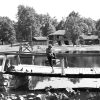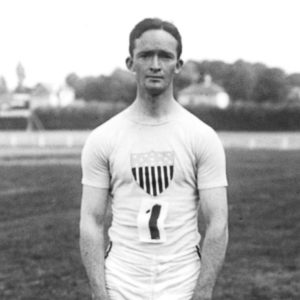calsfoundation@cals.org
James Alcorn "Indian" Rector (1884–1950)
James Alcorn “Indian” Rector, who took the silver medal in the 100 meters at the 1908 Olympic Games, was the first Arkansan to win an Olympic medal. His nickname “Indian” is said to have been given to him by his teammates or East Coast track fans who said he ran like an Indian.
Born on June 22, 1884, in Hot Springs (Garland County), James Alcorn Rector was the fourth of six children of Elias William Rector and Rosebud Alcorn Rector. His paternal grandfather, Henry Massie Rector, served as governor of Arkansas, while his maternal grandfather, James Lusk Alcorn, served as governor of Mississippi. His father practiced law and was a representative in the Arkansas General Assembly.
After attending schools in Hot Springs, Rector entered the college preparatory Lawrenceville School in Lawrenceville, New Jersey, in 1902. At Lawrenceville, he distinguished himself as both an athlete and a scholar. Rector played offensive end on the football team, pitched and played outfield on the baseball team, and sprinted and long jumped on the track team. As a senior in 1906, he pitched in eight of eleven games, winning all but two and striking out an average of twelve batters per game. Rector ranked fourth in batting with a .265 average. Before the start of the track season in 1906, the school’s newspaper, the Lawrence, described him as “unquestionably the best sprinter representing any preparatory school in the country.” Later that year, Rector tied the school record of 10.0 seconds for 100 yards and established a new school record of 22.0 seconds for 220 yards. In 1906, he graduated as the class valedictorian.
Rector entered the University of Virginia, where he studied law and participated in track and field. In 1908, he established school records of 5.4 seconds in the fifty-yard dash indoors, 10.0 seconds in the 100-yard dash indoors, 9.4 seconds in the 100-yard dash outdoors, 10.8 seconds in the 100 meters outdoors, and 21.8 seconds in the 220-yard dash outdoors. His time of 9.4 would have equaled the world record for 100 yards had the track meet been sanctioned officially by the Amateur Athletic Union.
Later in 1908, after racing to a 9.6-second victory in the 100-yard dash at the Southern Intercollegiate Championships, Rector decided to compete in the Eastern Olympic Trials in Philadelphia, Pennsylvania. After a week of training on the University of Pennsylvania track, Rector won his qualifying heat in the 100 meters in 10.8 seconds, equaling the American record for the distance. Penalized for false-starting in the final, he restarted the race one meter behind the rest of the field but caught the leaders, Lawson Robertson and Nate Cartmell, at eighty meters and finished in what looked like a three-way tie for first. After review, officials declared Robertson the winner, assigned Rector to second place, and placed Cartmell in third.
At the 1908 Olympic Games in London, England, Rector established himself as the man to beat in the 100 meters after equaling the Olympic record of 10.8 in his qualifying and semifinal heats. Before the final of the 100 meters, the coach of Reggie Walker, a South African sprinter who equaled the Olympic record in his semifinal, asked Rector to help his athlete with the crouch starting position popular among the Americans. Rector agreed and spent much of the day before the race coaching his opponent on the technique. In the final, Rector finished second to Walker, as the South African again equaled the Olympic record. With his silver medal performance, Rector became the first Arkansan to earn an Olympic medal.
After graduating with a Bachelor of Laws degree in 1909, Rector joined the law firm of Taliaferro, Rector and Taliaferro in St. Louis, Missouri. Although he retired from athletics after the 1908 Olympic Games, he resumed competing in 1910, with the hope of earning a place on the 1912 Olympic team. He competed in several fifty-yard dashes indoors and in the 100- and 220-yard dashes at a Lawrenceville alumni meet outdoors in 1910 but did not ultimately pursue a position on the Olympic team in 1912. During World War I, Rector served in a branch of the Secret Service, but the war ended the day before he was set to deploy overseas in 1918.
Rector married Viola Mesch in St. Louis, but the couple did not have any children. After retiring in 1943, he returned to Hot Springs and served as the manager of the Rector estate trust until his death onMarch 10, 1950.
For additional information:
Bailey, Jim. “Indian Rector Found No Gold Medal For Sportsmanship.” Arkansas Gazette, July 8, 1984, pp. 1E. 5E.
Hymans, Richard. The History of the United States Olympic Trials—Track & Field. Indianapolis: USA Track & Field, 2008.
Individual Data of Alumni of the University of Virginia (An Alumni Questionnaire), May 24, 1934. University of Virginia Archives. Albert and Shirley Small Special Collections Library. University of Virginia, Charlottesville, Virginia.
Individual Data of Alumni of the University of Virginia (An Alumni Questionnaire), May 13, 1949. University of Virginia Archives. Albert and Shirley Small Special Collections Library. University of Virginia, Charlottesville, Virginia.
“J. A. Rector Dies at Spa.” Arkansas Democrat, March 10, 1950, p. 22.
Lawrence (Clippings from 1905 to 1931). Lawrenceville School Archives, Lawrenceville, New Jersey.
Quercetani, R. L. A World History of Track and Field Athletics, 1864–1964. London: Oxford University Press, 1964.
Adam R.Hornbuckle
Spring Hill, Tennessee
 Early Twentieth Century, 1901 through 1940
Early Twentieth Century, 1901 through 1940 Recreation and Sports
Recreation and Sports James Rector
James Rector 




Comments
No comments on this entry yet.